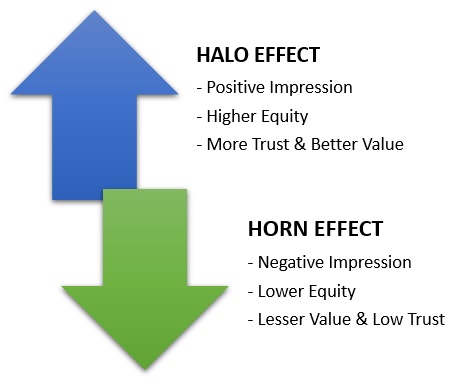The Horn effect is the process that makes us judge a person beforehand, attributing negative qualities in general to another known quality, for example, we tend to think that beautiful people are also kind and generous.
This effect would be an aspect of the Halo effect, which would represent this tendency or inclination to attribute characteristics to a person based on another person we already know.
- This effect plays an important role.
- For example.
- In the process of selecting positions.
- In this sense.
- The Horn effect can lead the recruiter to make inferences that do not correspond to reality and.
- From them.
- To make his decision.
- Vision increases the risk of choosing inappropriate candidates and rejecting the one that would be ideal.
Psychologist Edward L. Thorndike discovered this curious effect around 1920, this psychologist investigated the army and realized that when soldiers discovered something positive in their superiors, they automatically began to attribute other positive characteristics to them. Something bad, the superior in question would be judged in advance negatively by his subordinates. That’s how the Horn effect came in.
Years later, researchers Nisbett and Wilson of the University of Michigan in the United States divided 118 students into two groups, both watching a video featuring the same teacher, in one recording the teacher was kind, while in the other he was kind. unfriendly and authoritarian.
After the screening, the students described the teacher’s appearance and, curiously, those who watched the video with the teacher looking good described him as an attractive man, while the other group described the teacher as someone with a less privileged appearance.
This interesting experience can demonstrate how our perception of the other person affects our judgment within unknown limits. In addition, another interesting fact about the Horn effect is that once we assign a feature, it is very difficult to reverse that process. perceive in a person are positive, it is easier to ignore negative ones. The same goes for otherwise.
As mentioned above, the Horn effect can lead us to attribute several negative qualities to a person from a pretrial, which can be dangerous in a selection process, as it could lead the interviewer to reject suitable candidates for less prepared ones. but they have made a better initial impression.
To be aware of the risk of the Horn effect and avoid it during a selection process, we can follow these guidelines:
On the other hand, structuring the interviews can help us to be more objective. In this sense, we can start by specifying very clearly the skills required for a given position. Therefore, the objective will be to prepare an interview in which the capacity of the candidates to overcome the challenges is analyzed and to classify the skills of each one according to their importance for the position.
With these ideas we will be able to be more aware of the risks of the Horn effect in our day-to-day life and, above all, during a selection process, in this way we will be more objective in hiring employees, which will benefit our company more in the long term.
On the other hand, when we are candidates for a vacancy, we can also take advantage of this process in our favor, starting by directing our responses or presentation to achievements that highlight our best qualities, knowing the influence of this effect, we can also control it. in our day-to-day life when we are introduced to a person. In this way, we can try not to be deprived of relationships that can be very positive.
Editorial note: In the literature, the Halo effect can be found defined as a positive and negative attribution and also as the opposite of the Horn effect, that is, making only positive attributions.

